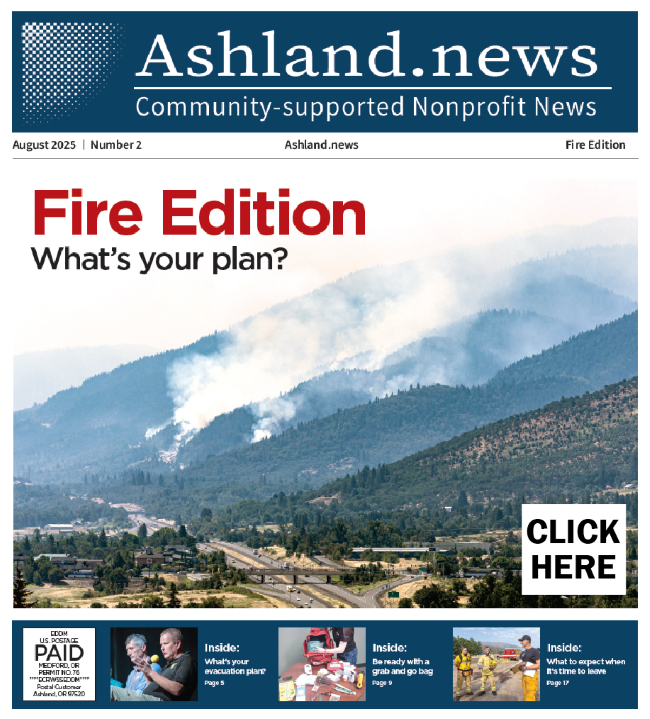Additional charges of $7 a month for fire and $5 each for ambulance and park services will come back for further discussion before implementation in next budget cycle
By Morgan Rothborne, Ashland.news
Ashland City Council haggled late into the evening Monday before a majority finally agreed — with some opposition — to include three additional fees on customer’s utility bills to support wildfire mitigation, public safety, and the Parks & Recreation department.
“We have kind of death by a thousand cuts in every department,” said City Manager Sabrina Cotta.
All departments have been subjected to cuts of around 5% for this budget biennium, Cotta said. Funds for the city’s general fund largely come from property taxes, which are capped by the state at a rate lower than rising inflation and personnel costs, Cotta said, mentioning a recent article by KATU.
“Ashland is not the only one looking at this with their general fund and compression. … Every city is having this discussion, so while Ashland is special, it is not special in this way,” she said.
Fees for public safety and Ashland Forest Resiliency have not increased since 2018 or 2019, respectively, according to the staff report. Without raising them, the city will be reducing staff, scaling back wildfire mitigation to largely education and reducing or eliminating the single-role EMS program, Cotta said.
Councilors asked clarifying questions about use of existing funds, then took turns citing wildfire as the existential threat and priority before agreeing to a $7-a-month fee with a request for staff to return the issue for a vote with the feasibility of a sliding scale fee based on the wildfire risk map.
After asking a few questions, the council agreed to a $5-a-month fee to support the city’s single-role EMS program, which devotes some staff members to medical calls, as it reduces the number of calls for service left unanswered by city’s fire department, as previously reported by Ashland.news. But calls for service are rising alongside overall costs, Cotta said.

“That program has relieved some of the overburdening that the staff has had. … They’re not constantly hearing the dropped calls. Today I met with fire and it became very clear just how dedicated they are. And when they cannot respond it is very distressing to them,” she said.
Cotta began the discussion of a new $5-a-month fee to support the Parks & Recreation Department by stating she requested it.
“We have a lot of visitors in our parks, they are an economic driver. … Council has stated that one of the priorities is economic development and for bringing families here. And for both of those things a robust Parks Department is essential,” she said.
The department has already seen the same cuts as others, but with this fee further cuts could be avoided, such as a reduction of hours at the Senior Center and further delaying construction of East Main Park, Cotta said.
Councilor Bob Kaplan asked why funds were needed to staff a park that wasn’t built yet. Parks Director Rocky Houston said it did not make sense to take on an asset that could not be maintained.
Cotta said at her request, Houston calculated the cost of increased vandalism in Ashland parks and came to a total of half a million dollars.
Councilor Dylan Bloom said adding an additional fee to support parks in the face of fees for and cuts to departments related to public safety was difficult to accept.
“I have to look at this in our total impact on our ratepayers; this is not a public need, this is not a safety measure, this is an amenity,” said Councilor Gina Duquenne.
“It’s a sweet amenity, I love it, in a perfect world … So many people are hanging on and I don’t want to add an additional fee,” she said.
Mayor Tonya Graham asked if this decision could be delayed. Houston said the city was already in the time frame for the grant and a delay would likely result in returning funds. Cotta stated the budget process was already underway and if the fee was rejected, cuts would be made.
Graham reflected on the historical context of the situation.
“Ashland has a world class parks system because years ago this community decided that it wanted one,” she said.
Residents wanted a park a quarter mile from any residence and East Main is the last piece of that puzzle.
“For a long time, the priority in this community has been to expand our parks, expand our trails. … We’re not at a point where we can do that anymore, and we’re not at a point where we can maintain what we have anymore. So now that discussion is what level of service and amenities does the community want, moving forward?” Cotta said.
Councilor Eric Hansen said for him, it was an unfortunate essential.

“We have a livability standard here that, although it is not an essential service, I believe it is essential to this community to maintain. … It is unfortunate that it is stacking up on everyone’s bill, but everyone uses parks,” he said.
When pressed for more information by Councilor Jeff Dahle, Houston first cited numbers such as $426,000 to operate the ice rink compared to roughly $200,000 in revenue, and $250,000 to 300,000 to operate the pool with roughly $200,000 in revenue.
“Quality of life is essential. … The number-one reason why people come to this community, on Expedia, any guesses? It’s not because of some really cool plays written by a guy that was living in the 1600s, it’s Lithia Park,” Houston said.
Council largely agreed the issue was brought without sufficient information. Councilor Doug Knauer asked if the cuts were chosen to amplify the perceived necessity of a fee. Councilors Dahle and Bob Kaplan each stated a belief there was another way and Bloom referred to the presentation as “unfair to the process” and “irresponsible.”
Duquenne and Bloom rejected the fee. Kaplan and Knauer were in tepid acceptance with a desire to reassess. Dahle wanted to revisit how to fund parks. Hansen voiced unwavering support and noted the overall budget shortfall and need for revenue. Graham asked for and received consensus for staff to return in the near future with more information.
Utility assistance programs
In other council business Monday, councilors considered how to expand the city’s utilities assistance programs.
The city has three existing programs — Ashland Low Income Energy Assistance Program (ALIEAP), senior or disabled utilities discount, and emergency heat assistance, said Finance Director Marinane Berry.
In 2024, 517 customers used the low income energy assistance program with an average relief to each family of $206, while the senior and disabled program was utilized by 281 customers with an average relief of $360, according to a staff report. included with meeting minutes. Staff initially recommended creating a pilot program and, after a year, assessing if it could be expanded further or would need to be cut back.
Council was unanimously in agreement the program should be offered with the best possible criteria and have a suitable cap to prevent “throttling it back after getting out the gate,” as Knauer described it.
Councilors then invested time in a discussion of how to create a strictly income-driven program without removing assistance from those utilizing existing programs or creating a program that could grow to the point of necessitating raising rates.
After an initial consensus to keep the program simple, Cotta asked council to take note the discussion had moved into tiers, sliding scales and working with community partners such as Oregon Health Plan and SNAP to both provide qualifications and inform those who qualify.
Cotta recommended and received council approval to wait for staff to research and structure a simple program. But she said around 30-40% of Ashland’s residents could qualify if the city used OHP as its metric.
Berry also presented one of several discussions of the structure of the city’s accounting fund to assist council in the ongoing biennial budget process.
Email Ashland.news reporter Morgan Rothborne at [email protected].
April 3: Updated to correct Councilor Jeff Dahle’s position on the proposed parks fee; he did not agree to it. He wants to revisit how best to fund parks.




















